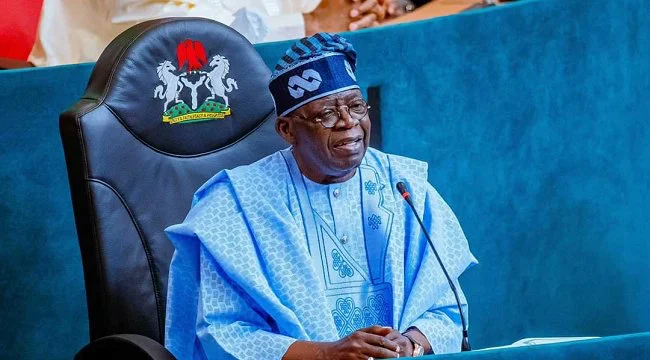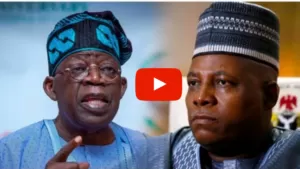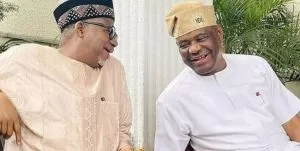‘Not Good for Nigeria’, Tinubu Refutes One-Party State Claims

President Bola Ahmed Tinubu has firmly dismissed speculations that Nigeria is sliding toward a one-party state under his administration, emphasizing that such a system would be detrimental to the nation’s democratic growth. Speaking at a recent event in Abuja, the President addressed concerns raised by political analysts and opposition figures who have pointed to the growing dominance of the All Progressives Congress (APC) as a potential threat to Nigeria’s multi-party democracy.
Tinubu, a former governor of Lagos State and a key figure in Nigeria’s political landscape, drew from his own experience to counter these claims. “I was an opposition governor in Lagos for eight years, and I know what it means to stand for democracy,” he said. “The APC has no intention of stifling opposition or creating a one-party state. That is not good for Nigeria, and it is not good for our democracy.” He attributed the APC’s recent gains in political influence to the party’s achievements in governance, particularly in the areas of economic reforms, infrastructure development, and security, despite being in power for less than two years.
The President’s remarks come amid growing concerns about the state of Nigeria’s political opposition. The Peoples Democratic Party (PDP), once a formidable force, has been plagued by internal crises and defections, with several prominent members crossing over to the APC. Similarly, the Labour Party and other smaller opposition groups have struggled to maintain cohesion and present a united front. Political analysts have warned that the weakening of opposition parties could inadvertently pave the way for a de facto one-party system, which they argue could undermine democratic accountability and pluralism.
Critics point to recent political developments as evidence of this trend. In the past year, several high-profile opposition figures, including former governors and senators, have defected to the APC, citing the party’s leadership and vision under Tinubu. Additionally, the APC’s victories in off-cycle gubernatorial elections and local government polls have fueled perceptions of its growing dominance. Some analysts argue that the opposition’s inability to effectively challenge the ruling party stems from its own internal divisions and lack of a compelling alternative agenda.
However, Tinubu maintained that Nigeria’s democracy thrives on competition and diverse voices. “We welcome a strong opposition because it keeps us on our toes,” he said. “But the opposition must also do its homework, organize itself, and present a clear vision to Nigerians.” He urged opposition parties to focus on constructive criticism and policy alternatives rather than engaging in divisive rhetoric.
Public reactions to Tinubu’s comments have been mixed. Supporters of the President argue that the APC’s growing popularity reflects public confidence in his administration’s policies, such as the removal of fuel subsidies, efforts to stabilize the naira, and investments in renewable energy. “The people are seeing results, and that’s why they are aligning with the APC,” said Adebayo Olusola, a Lagos-based APC chieftain. “This is not about a one-party state; it’s about a party delivering on its promises.”
On the other hand, opposition leaders and civil society groups have expressed skepticism. Dr. Aisha Mohammed, a political analyst based in Abuja, cautioned that the APC’s dominance could erode democratic checks and balances. “When one party becomes too powerful, it risks creating a system where dissent is marginalized,” she said. “The opposition needs to regroup, but the ruling party must also ensure a level playing field for all political actors.”
The debate over Nigeria’s political trajectory is not new. Since the return to democratic rule in 1999, the country has oscillated between periods of strong opposition and dominant-party rule. The PDP held sway for 16 years before the APC’s landmark victory in 2015, which marked the first time an opposition party unseated an incumbent at the national level. Tinubu’s rise to the presidency in 2023 further solidified the APC’s grip on power, raising questions about the future of multi-party democracy in Africa’s most populous nation.
As Nigeria approaches the 2027 general elections, the health of its democratic institutions will be closely watched. Tinubu’s administration has pledged to strengthen electoral processes and promote inclusivity, but critics argue that concrete actions—such as ensuring the independence of the Independent National Electoral Commission (INEC) and addressing voter suppression concerns—are necessary to dispel fears of a one-party state.
For now, Tinubu remains focused on his administration’s agenda, which includes economic diversification, job creation, and tackling insecurity. “Our goal is to build a Nigeria where every citizen has a voice and every party has a chance,” he said. “A one-party state is not our vision, and we will work to ensure that democracy flourishes.”
As the political landscape evolves, Nigerians await whether the opposition can overcome its challenges and mount a credible challenge to the APC’s dominance, or if the ruling party’s influence will continue to grow unchecked.






